
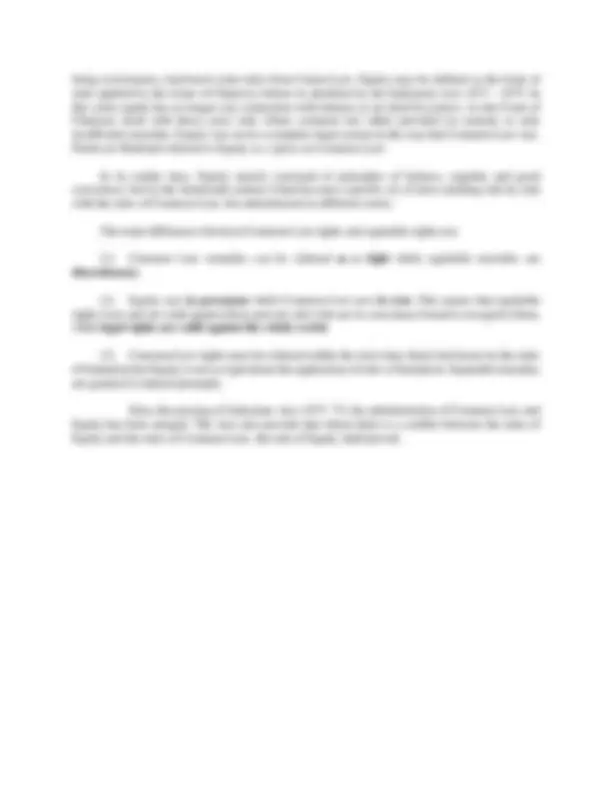
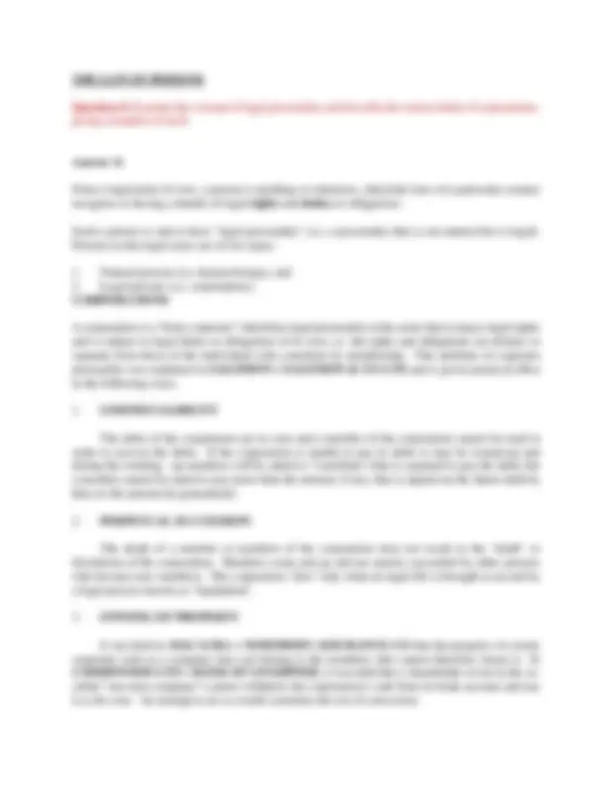
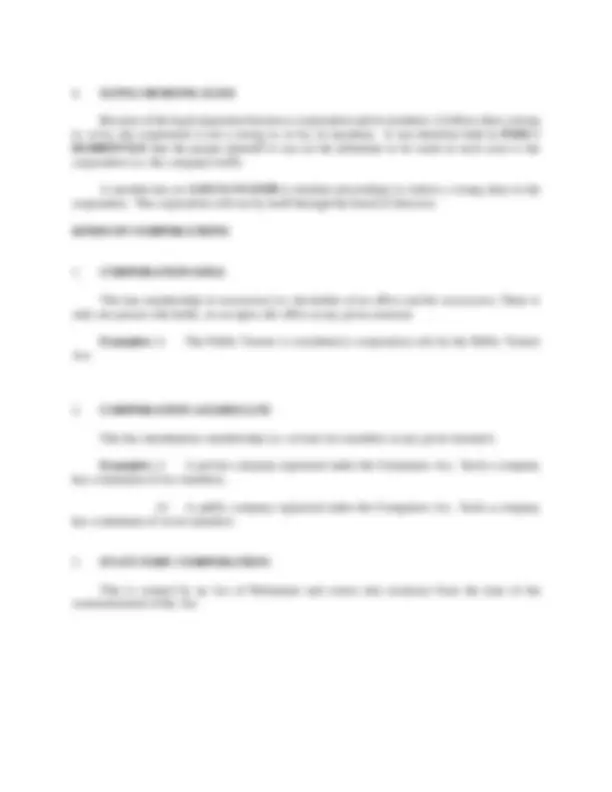
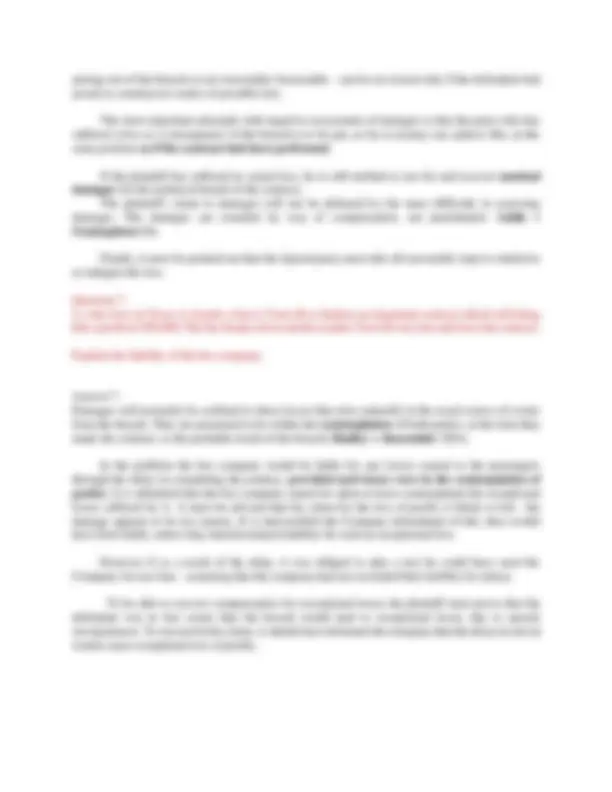
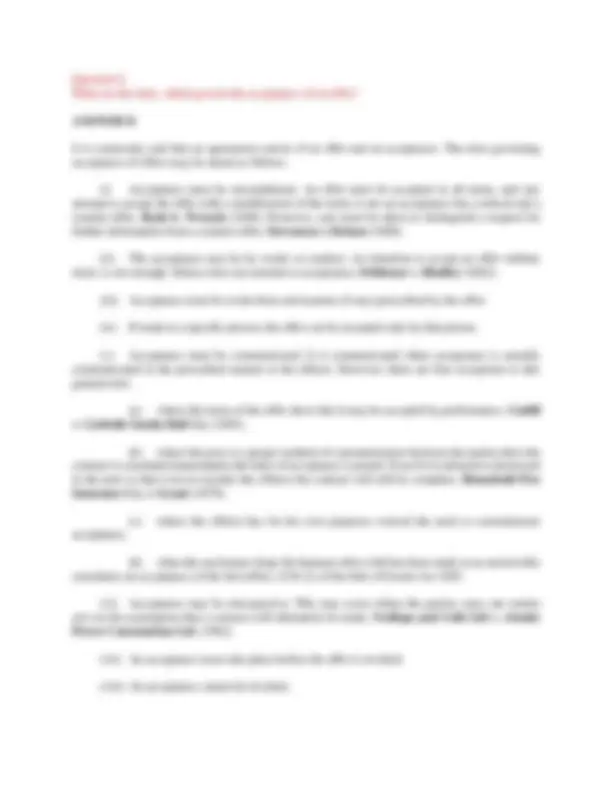
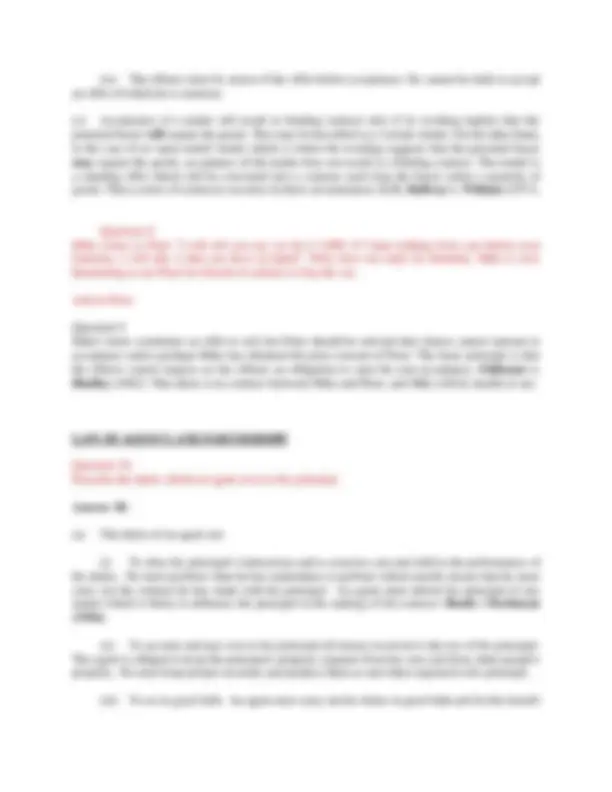
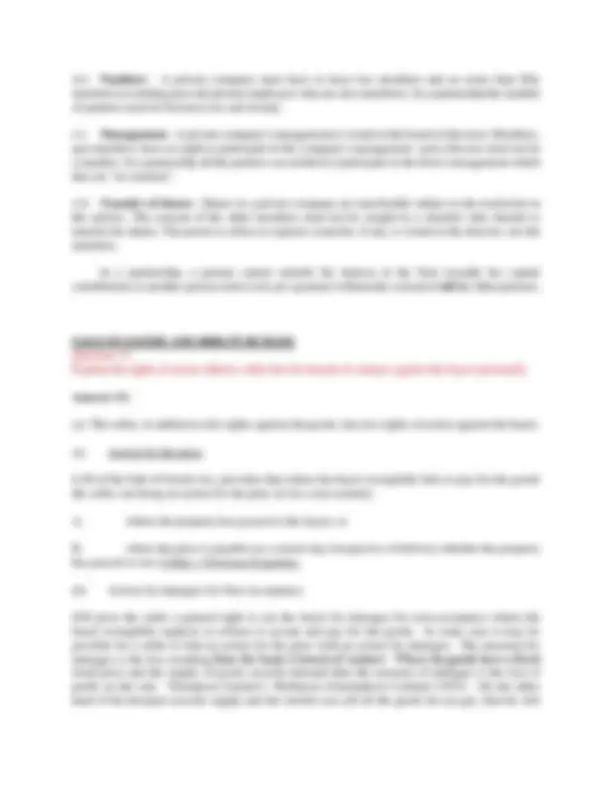
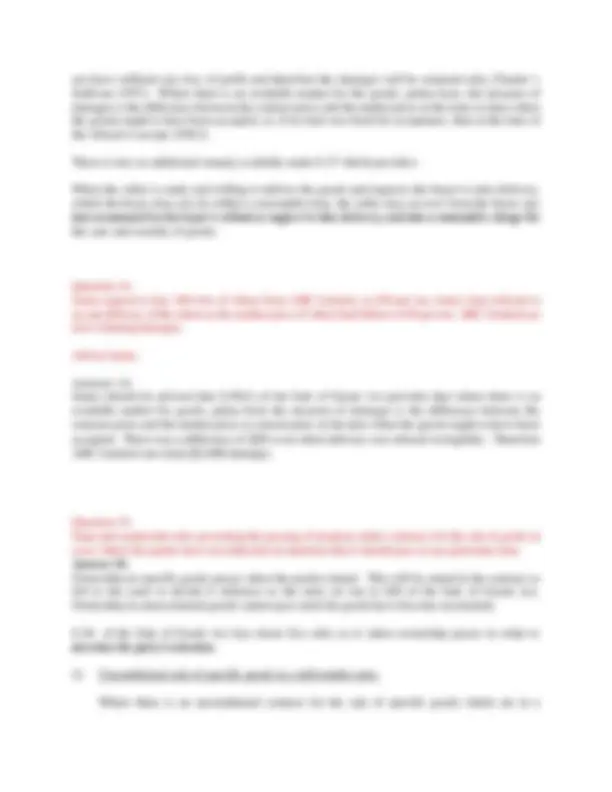
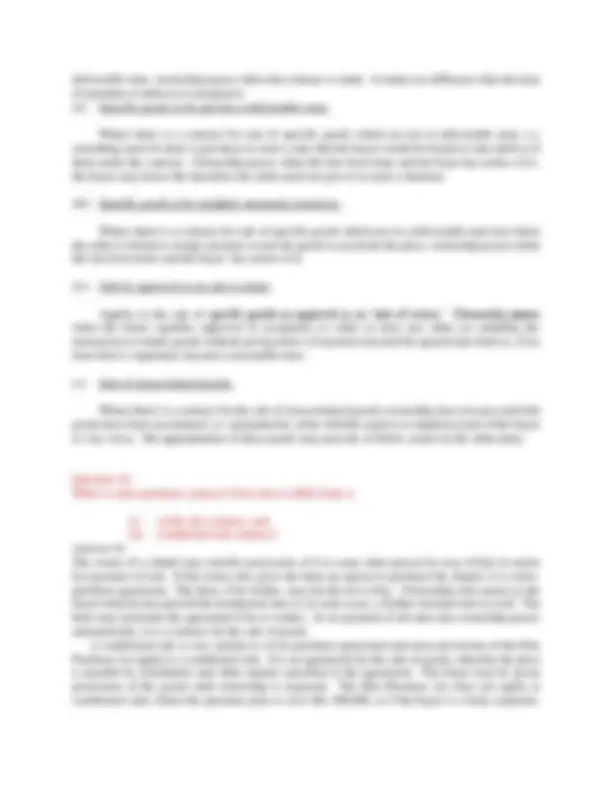
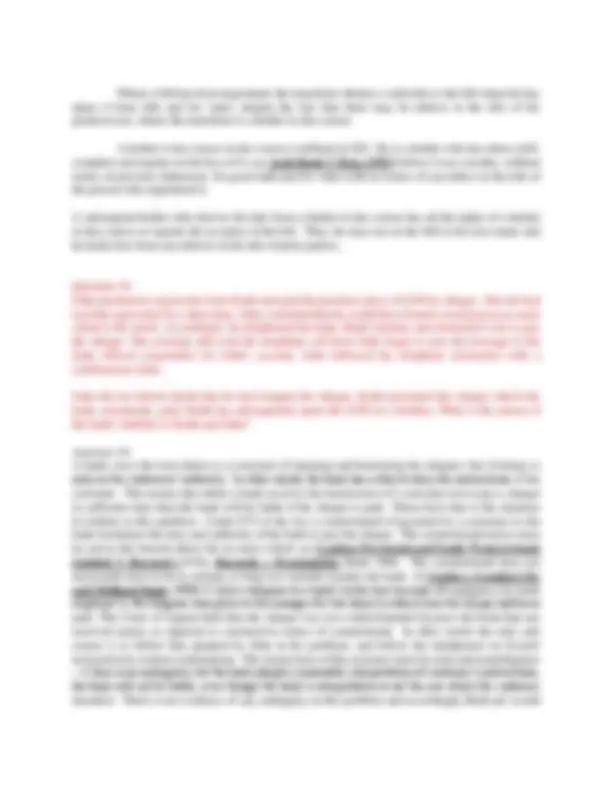
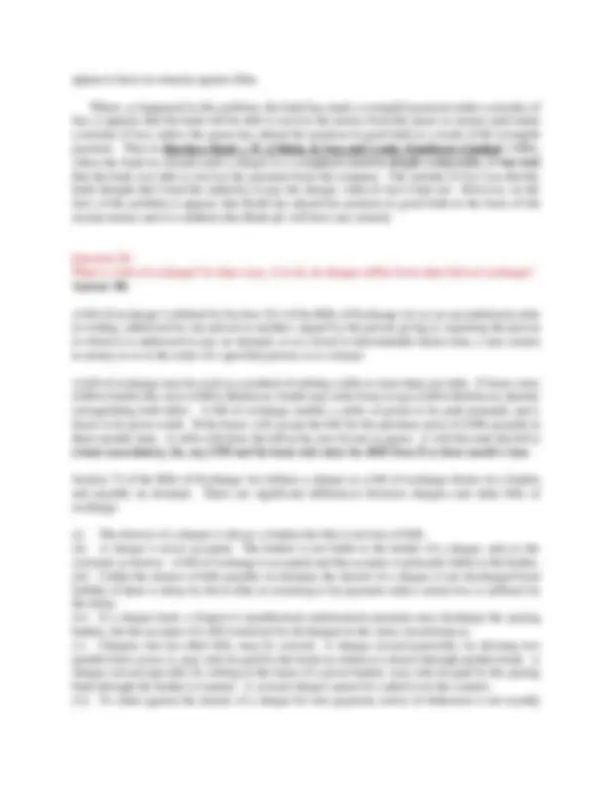
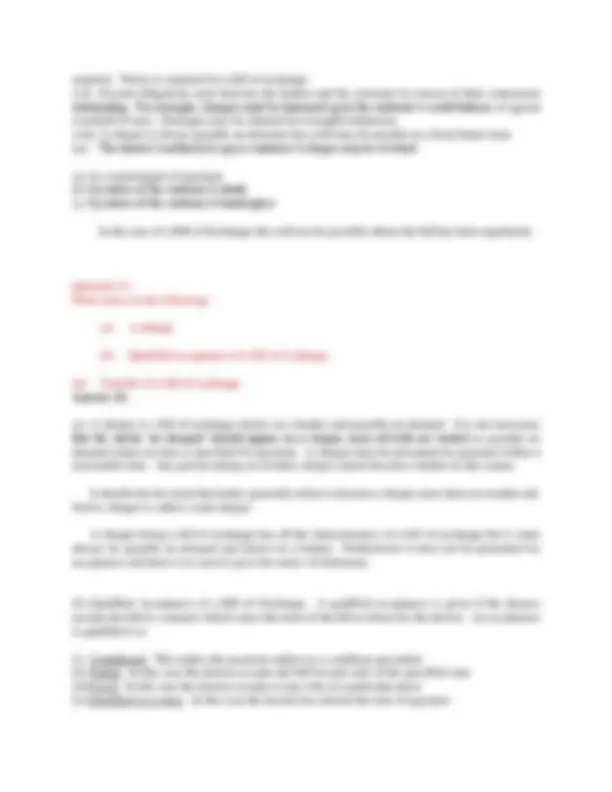
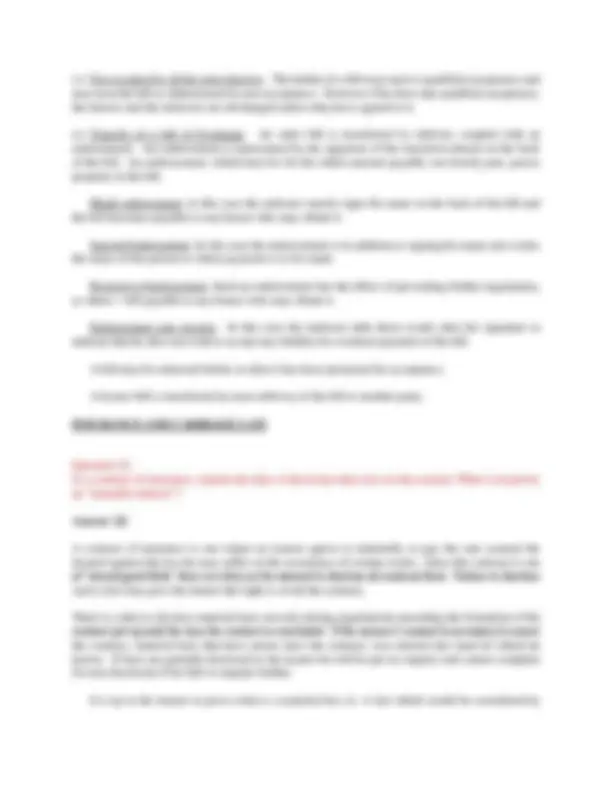
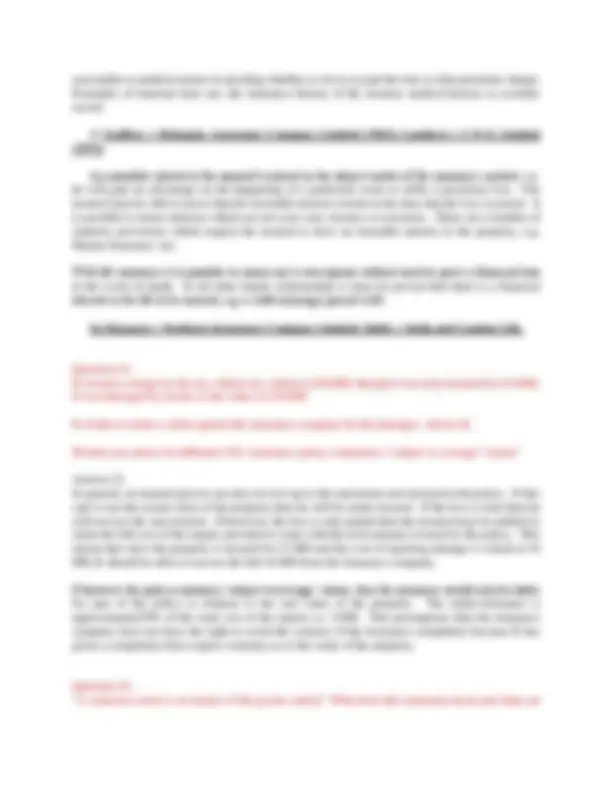
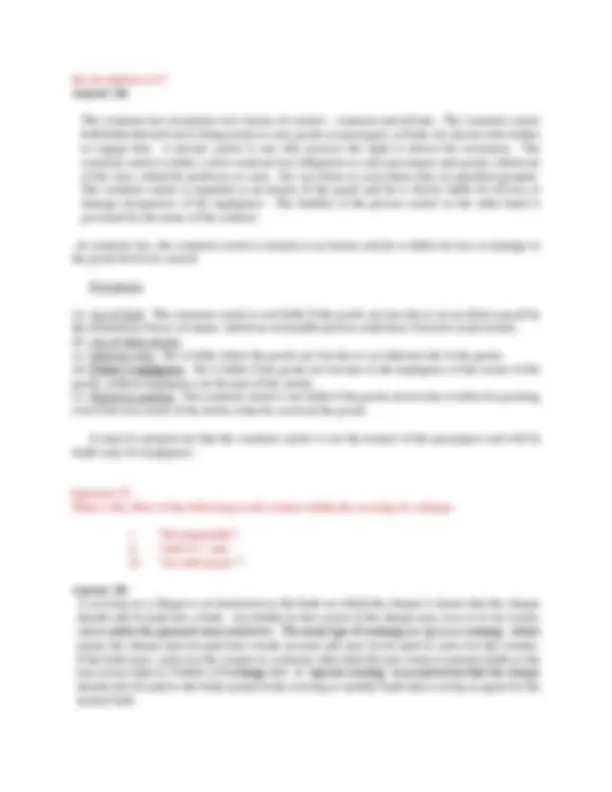
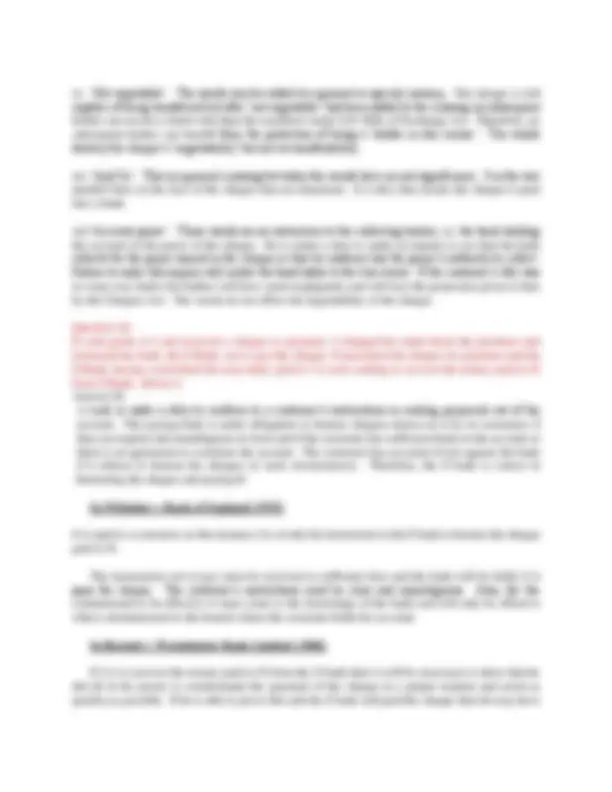
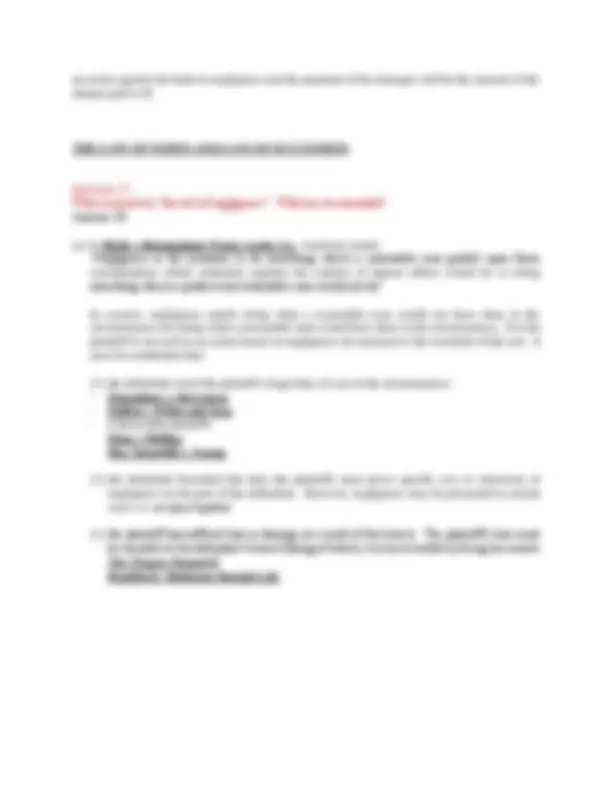
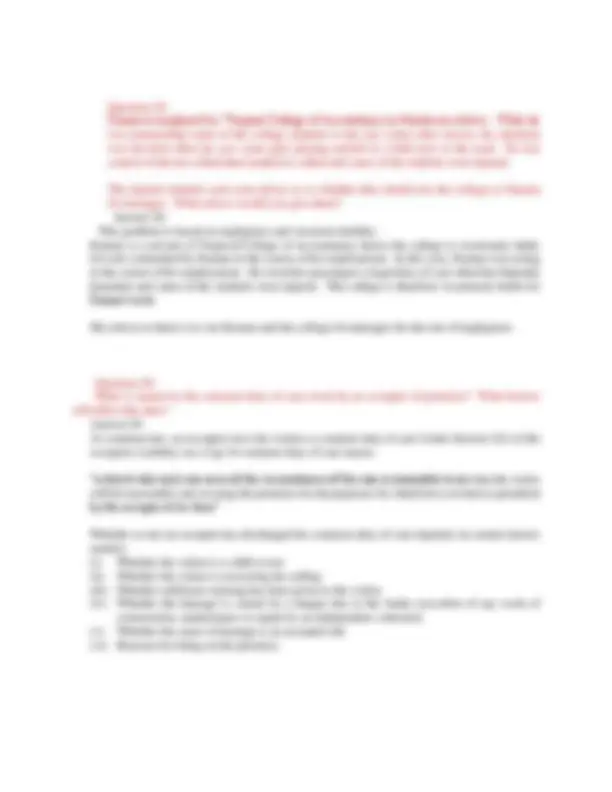
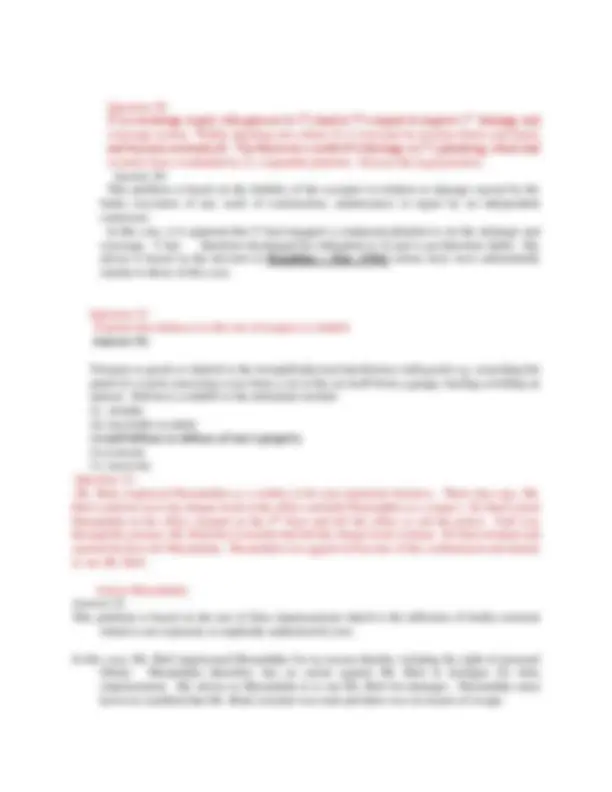
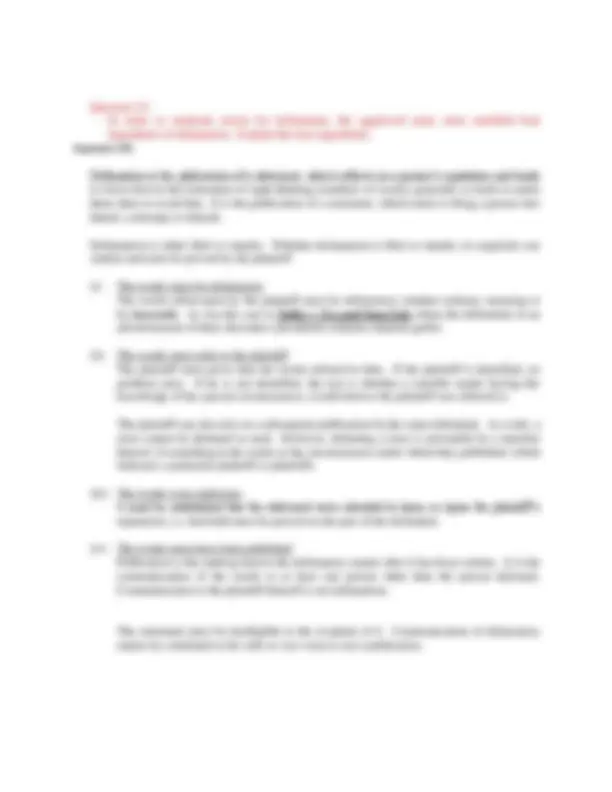
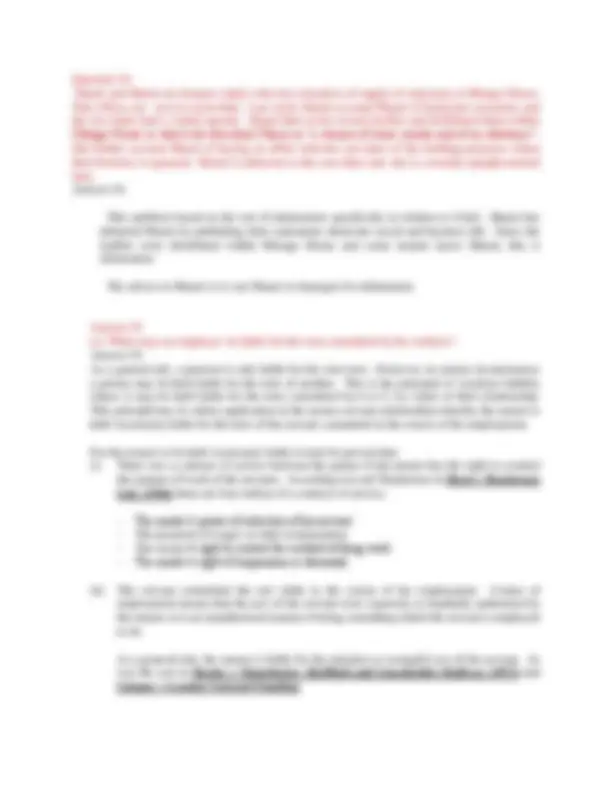
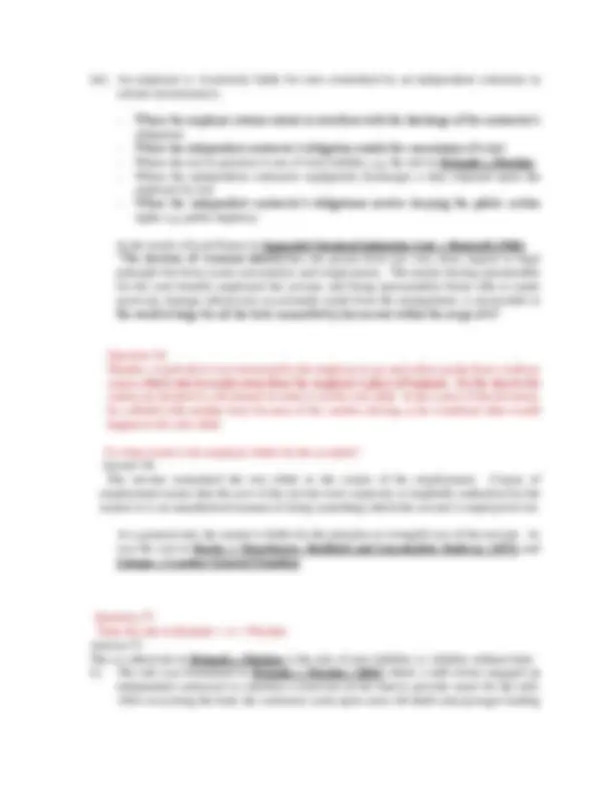
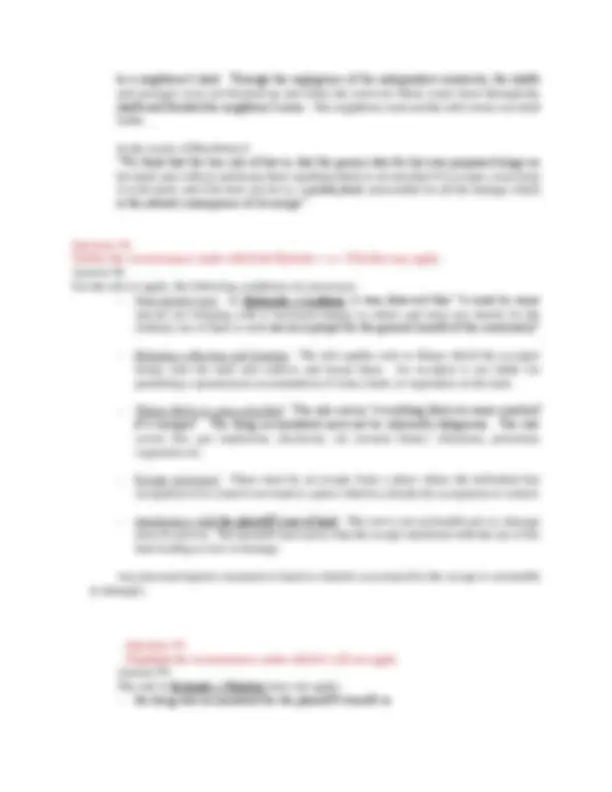
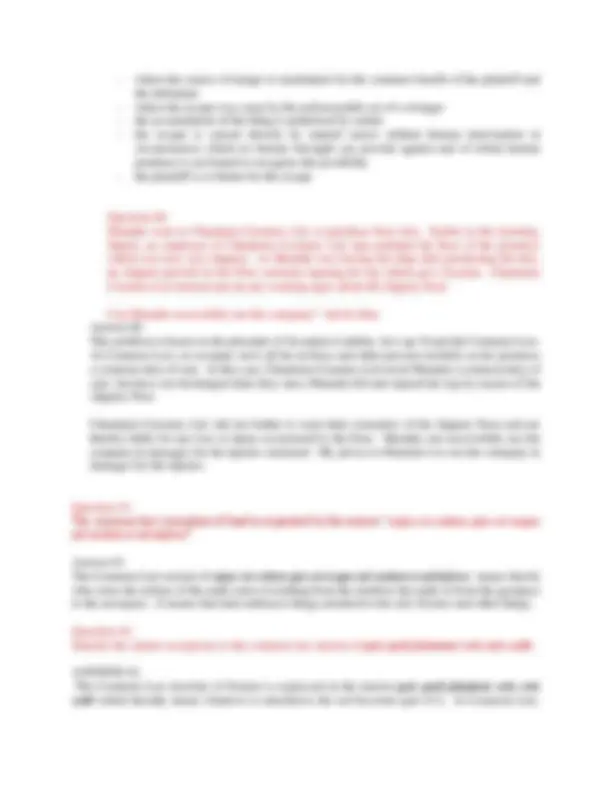
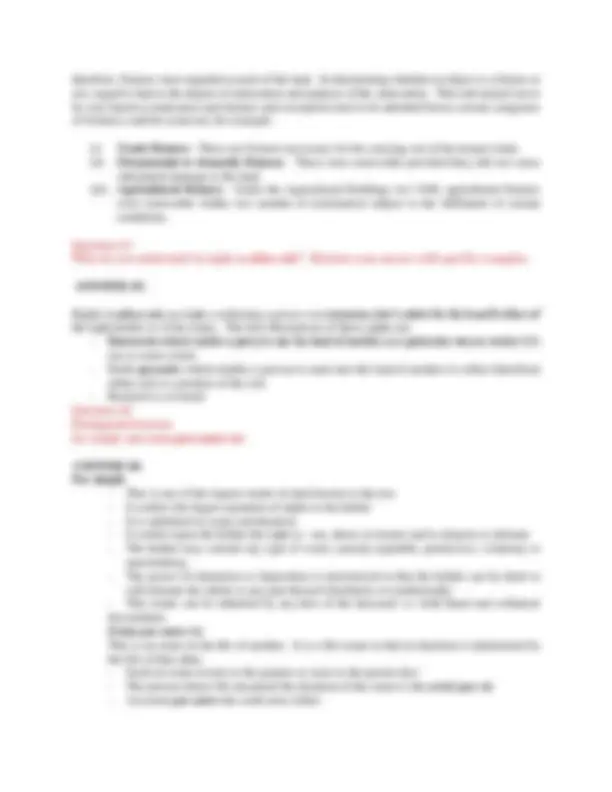
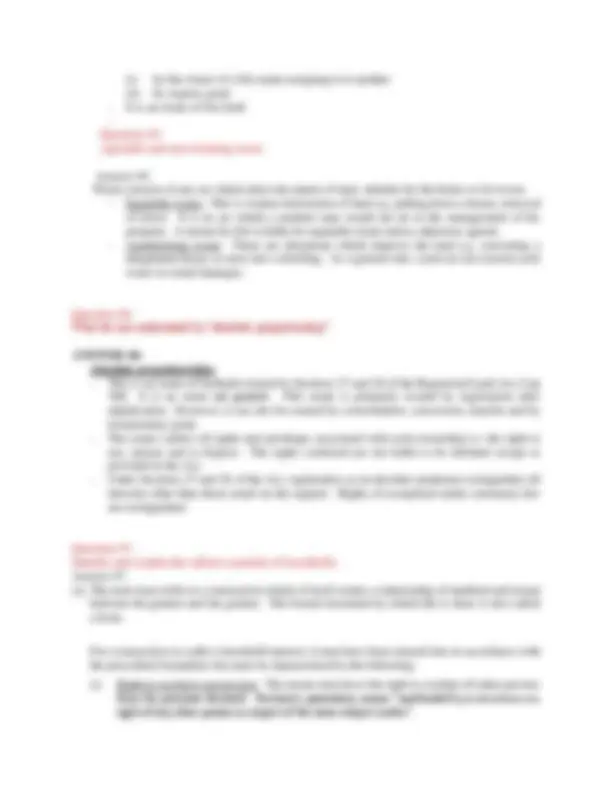
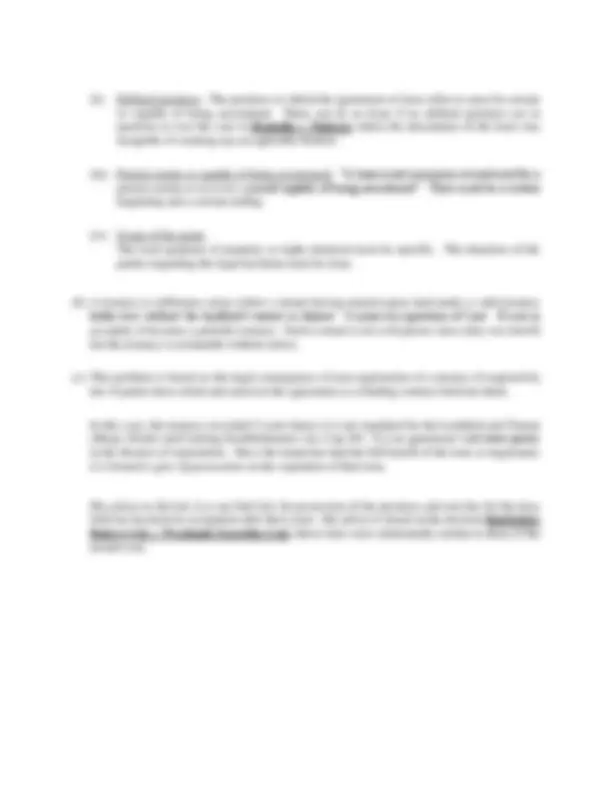


Study with the several resources on Docsity

Earn points by helping other students or get them with a premium plan


Prepare for your exams
Study with the several resources on Docsity

Earn points to download
Earn points by helping other students or get them with a premium plan
Community
Ask the community for help and clear up your study doubts
Discover the best universities in your country according to Docsity users
Free resources
Download our free guides on studying techniques, anxiety management strategies, and thesis advice from Docsity tutors
Sources of Law, Legal Personality, and Common Law vs. Equity
Typology: Quizzes
1 / 35

This page cannot be seen from the preview
Don't miss anything!




























Question 1:
Explain the importance of the following: (a) ‘ratio decidendi’ and ‘obiter dicta’ in the doctrine of binding precedent. Answer 1: (a) Ratio decidendi and obiter dicta
These concepts are crucial to the doctrine of binding precedent, which in turn is a central feature of the legal system. Much of the law is judge-made, but in developing the law the judges do not act in an arbitrary fashion, dispensing justice on a case-by-case basis. The doctrine of binding precedent represents a series of principles whereby cases previously decided by higher courts, or in some circumstances by courts of co-ordinate jurisdiction, are binding on judges trying a case. The operation of doctrine rests on a strict hierarchy of courts, but also depends on being able to identify the ratio decidendi —the reasoning which is central to the decision of the case. The ratio decidendi is the rule of law on which the decision is based. It is only the ratio decidendi which binds judges in future cases. It is not always easy to extract the ratio decidendi from a case. For example, sometimes a court may state more than one reason for the decision in the case. It may be that the statement of the applicable legal reasons which the judge makes is wider than that justified by the material facts of the case. In these circumstances the ration of the case is confined to that part of the judgment which relates to the material facts. Sometimes it may be difficult to distinguish the ratio of the case from comments which are more accurately defined as 'obiter dicta'. Obiter dicta are statements of legal principle which relate to facts which did not exist in the case of decision, or were not material in the case. As such, they are not binding on inferior courts, but they can have an enormous impact on the development of the law. Thus, the principle of promissory estoppel, now well embedded in the modern law of contract, re-emerged into the modern law following an obiter statement in Central London Property Trust Ltd v High Trees House Ltd (1947). Similarly, the extension of the duty of care to the use of negligent words in certain circumstances was the product of statements in Hedly Byrne & Co Ltd v Heller and Partners Ltd (1964) which were strictly obiter, because the use of the words complained of in that case was in fact protected by a disclaimer or responsibility.
Question 2: The ‘literal’ and ‘golden’ rules of statutory interpretation Answer 2 : 'Literal' and 'golden' rules of interpretation In their consideration of statutes, judges have to decide the exact meaning of the words, which have been used in the statute. It is through this process of interpreting the statute that the courts give effect to the perceived intention of Parliament. Normally, the words of a statute are quite straightforward and give rise to no particular difficulties of interpretation. Occasionally, however, problems arise and it is then up to the judge using one of the established rules of statutory interpretation, to give effect to the statute. The usual rule of statutory interpretation is the literal rule. Under this rule the judge will give effect to the ordinary or literal meaning of the words which have been used in the statute, even though the result produced is unjust or undesirable: D.O.E. v Royal Insurance (1987) where a claim which required 14 years occupation of land was lost by two days. If all the words in a statute were interpreted in their ordinary, literal or grammatical sense and an absurd result were to be consequence , then a judge is permitted to modify the literal meaning in order to avoid such a result. He will then use what is known as the 'golden rule' of interpretation. A classic example is the case of R v Allen (1872) which was concerned with the crime of bigamy under s.57 of the Offenses Against the Person Act 1861. The enactment made marriage to a second spouse while still married to the first spouse and offence. The difficulty was that the second marriage was legally ineffective during the subsistence of the first marriage. Accordingly the provision was interpreted to mean 'going through a form of marriage with one spouse while still being married to another'. Question 3: Explain the difference between Common Law and Equity. In what ways do Common Law rights differ from equitable rights. Answer 3 : The difference between Common Law and Equity is historical. The Common Law is that part of the law of England, which was formulated, developed and administered by the old common law courts. It was originally based on the common customs of the country, and is unwritten. It is judge made system of law, originated in ancient customs, which were clarified, extended and universalized by the English judges. Common Law is that part of the law which was developed and formerly administered by the 'Common Law Courts'. It was a unification of the customs of the English, welded together by the practice of the Royal Courts.
Equity, on the other hand, is that part of the English Law which was developed and formerly administered by the Court of Chancery to supplement the rules and procedure of Common Law. The Court of Chancery worked on the principles of conscience and fairness and the early Chancellors,
Question 4: Examine the concept of legal personality and describe the various kinds of corporations, giving examples of each. Answer 4: From a legal point of view, a person is anything or substance, which the laws of a particular country recognise as having a bundle of legal rights and duties or obligations. Such a person is said to have "legal personality" (i.e. a personality that is not natural but is legal). Persons in this legal sense are of two types:
Because of the legal separation between a corporation and its members, it follows that a wrong to, or by, the corporation is not a wrong to, or by, its members. It was therefore held in FOSS v HARBOTTLE that the proper plaintiff to sue (or the defendant to be sued) in such cases is the corporation (i.e. the company itself). A member has no LOCUS STANDI to institute proceedings to redress a wrong done to the corporation. The corporation will sue by itself through the board of directors. KINDS OF CORPORATIONS
This occurs where the obligations or duties under a contract are transferred from one party to another, as where A lends money to B to be repaid at the end of the month. Before that time arrives, it is agreed that B's father (C) will repay the loan. The contract between A and B is thereby discharged. v FRUSTRATION: A contract may be discharged by frustration in a number of ways, of which the following are examples from case law: (a) Destruction of subject-matter of the contract before the time of performance arrives, Example: TAYLOR V CALDWELL (b) Frustration of the "common venture", i.e. a new situation has a risen which renders it impossible to perform the contract as originally anticipated. Example: KRELL V HENRY (c) By supervening illegality caused by a change in the law or government interference so that it becomes illegal to perform the contract. Example: METROPOLITAN WATER BOARD V DICK (d) Personal incapacity which renders it impossible for a party to a contract to perform it because of unexpected or sudden illness. Example: CONDOR V THE BARRON KNIGHTS BAND Question 6: What principles will the court apply when assessing unliquidated damages for breach of contract? Answer 6: In most cases damages are unliquidated. The principles regarding the assessment of damages were explained in Hadley v. Baxendale. The consequences for which damages may be recovered must be proximate and not too remote. The injured party should, so far as money can do it, be placed in the same situation as if the breach had never occurred. The damage will however, be too remote unless it is such that a reasonable man could have foreseen it as likely to result, according to the normal course of things, or because he had a knowledge of special circumstances. The party in breach is not liable for all the direct consequences which flow from the breach, but only for those consequences which were reasonably foreseeable. Special damages - not naturally
arising out of the breach or not reasonably foreseeable - can be recovered only if the defendant had actual or constructive notice of possible loss. The most important principle with regard to assessment of damages is that the party who has suffered a loss as a consequence of the breach is to be put, as far as money can achieve this, in the same position as if the contract had been performed. If the plaintiff has suffered no actual loss, he is still entitled to sue for and recover nominal damages for the technical breach of the contract. The plaintiff's claim to damages will not be defeated by the mere difficulty in assessing damages. The damages are awarded by way of compensation, not punishment: Addie v Gramaphone Co. Finally, it must be pointed out that the injured party must take all reasonable steps to minimise or mitigate the loss. Question 7: A, who lives in Town A, boards a bus to Town B to finalize an important contract which will bring him a profit of £50,000. The bus breaks down and he reaches Town B very late and loses the contract. Explain the liability of the bus company. Answer 7: Damages will normally be confined to those losses that arise naturally in the usual course of events from the breach. They are presumed to be within the contemplation of both parties, at the time they made the contract, as the probable result of the breach ( Hadley v. Baxendale 1 854). In the problem the bus company would be liable for any losses caused to the passengers through the delay in completing the journey, provided such losses were in the contemplation of parties. It is submitted that the bus company cannot be taken to have contemplated the exceptional losses suffered by A. A must be advised that his claim for the loss of profits is likely to fail - the damage appears to be too remote. If A had notified the Company beforehand of this, they would have been liable, unless they had disclaimed liability for such an exceptional loss. However if as a result of the delay A was obliged to take a taxi he could have sued the Company for taxi fare - assuming that the company had not excluded their liability for delays. To be able to recover compensation for exceptional losses the plaintiff must prove that the defendant was in fact aware that the breach would lead to exceptional losses due to special circumstances. To succeed in his claim, A should have informed the company that the delay in arrival would cause exceptional loss of profits.
(ix) The offeree must be aware of the offer before acceptance. He cannot be held to accept an offer of which he is unaware. (x) Acceptance of a tender will result in binding contract only if its wording implies that the potential buyer will require the goods. This may be described as a 'certain' tender. On the other hand, in the case of an 'open-ended' tender which is where the wording suggests that the potential buyer may require the goods, acceptance of the tender does not result in a binding contract. The tender is a standing offer which will be converted into a contract each time the buyer orders a quantity of goods. Thus a series of contracts can arise in these circumstances, G.N. Railway v. Witham (1873). Question 9: Mike writes to Peter "I will sell you my car for £ 2,000. If I hear nothing from you before next Saturday, I will take it that you have accepted". Peter does not reply by Saturday. Mike is now threatening to sue Peter for breach of contract to buy the car. Advise Peter. Question 9: Mike's letter constitutes an offer to sell, but Peter should be advised that silence cannot amount to acceptance unless perhaps Mike has obtained the prior consent of Peter. The basic principle is that the offeror cannot impose on the offeree an obligation to state his non-acceptance, Felthouse v. Bindley (1862). Thus there is no contract between Mike and Peter, and Mike will be unable to sue. LAW OF AGENCY AND PARTNERSHIP Question 10: Describe the duties which an agent owes to his principal. Answer 10: (a) The duties of an agent are: (i) To obey his principal's instructions and to exercise care and skill in the performance of his duties. He must perform what he has undertaken to perform which usually means that he must carry out the contract he has made with his principal. An agent must inform his principal of any matter which is likely to influence the principal in the making of the contract: Heath v Parkinson (1926). (ii) To account and pay over to his principal all money received to the use of his principal. The agent is obliged to keep the principal's property separate from his own and from other people's property. He must keep proper accounts and produce them as and when required to his principal. (iii) To act in good faith. An agent must carry out his duties in good faith and for the benefit
of his principal. He must never allow his own interests and those of his principal to conflict. In other words, when he is acting for his principal he must not advance his own interests nor turn himself into a principal without his principal's consent. For instance, an agent should not accept commission from both parties to a contract unless he makes full disclosure to and obtains the consent of each of the principals involved. Because of his fiduciary relationship with his principal, an agent must not make any secret profits or accept any bribes. However, where an agent does make a secret profit or accepts a bribe from the party with whom he contracts on behalf of his principal then the principal may: (a) recover the amount of the secret profit from the agent, Reading v. A.G. (1951); (b) dismiss the agent without notice, Boston Deep Sea Fishing & Ice Co v Ansell (1888); (c) refuse to pay the agent his commission or other remuneration, Andrews v Ramsay & Co (1903); (d) proceed for damages against the third party who paid the bribe and the agent for conspiracy to defraud as they are jointly and severally liable, Salford Corporation v Lever (1891); (e) repudiate the contract, irrespective of any effect the bribe may have had on the agent's mind, Shipway v Broadwood (1899). Finally, the agent or third party who paid the bribe or both may also be prosecuted under the Prevention of Corruption Act. However, it is necessary to prove that there was a corrupt motive. (iv) To act personally. The general rule is that the agent must perform his duties personally. Thus the employment of a sub-agent by the agent will constitute a breach of his obligation to his principal. This rule applies in all cases where personal trust is put in the agent or where personal skill is required. However, there are a number of exceptions to this rule: (a) where it is sanctioned by custom; (b) where delegation is necessary to ensure proper performance; (c) where there is an agreement, express or implied, to allow it. For example, in the case of an emergency it may be permissible to use a sub-agent: De Bussche v Alt (1878). Question 11: Philip instructs Steven to sell his house and agrees to pay him £200 commission on completion. Steven sells the house and on completion is paid his commission by Philip. Philip subsequently discovers that Steven has also been paid a commission of £100 by the purchaser.
(iv) Numbers - A private company must have at least two members and no more than fifty members (excluding past and present employees who are also members). In a partnership the number of partners must be between two and twenty. (v) Management - A private company's management is vested in the board of directors. Members, qua members, have no right to participate in the company's management and a director need not be a member. In a partnership all the partners are entitled to participate in the firm's management which they do "in common". (vi) Transfer of shares - Shares in a private company are transferable subject to the restriction in the articles. The consent of the other members need not be sought by a member who intends to transfer his shares. The power to refuse to register a transfer, if any, is vested in the director, not the members. In a partnership, a partner cannot transfer his interest in the firm (usually his capital contribution) to another person (who is not yet a partner) without the consent of all the other partners. SALE OF GOODS AND HIRE PURCHASE Question 13: Explain the rights of action which a seller has for breach of contract against the buyer personally. Answer 1 3: (a) The seller, in addition to his rights against the goods, has two rights of action against the buyer. (a) Action for the price S.49 of the Sale of Goods Act, provides that where the buyer wrongfully fails to pay for the goods the seller can bring an action for the price in two cases namely: A. where the property has passed to the buyer; or B. where the price is payable on a certain day irrespective of delivery whether the property has passed or not, Colley v Overseas Exporters. (b) Action for damages for Non-Acceptance S50 gives the seller a general right to sue the buyer for damages for non-acceptance where the buyer wrongfully neglects or refuses to accept and pay for the goods. In some case it may be possible for a seller to link an action for the price with an action for damages. The measure for damages is the loss resulting from the buyer’s breach of contract. Where the goods have a fixed retail price and the supply of goods exceeds demand then the measure of damages is the loss of profit on the sale. Thompson Limited v Robinson (Gunmakers) Limited (1953). On the other hand if the demand exceeds supply and the retailer can sell all the goods he can get, then he will
not have suffered any loss of profit and therefore the damages will be nominal only, Charter v Sullivan (1957). Where there is an available market for the goods, prima facie, the measure of damages is the difference between the contract price and the market price at the time or times when the goods ought to have been accepted, or, if no time was fixed for acceptance, then at the time of the refusal to accept, S50(3). There is also an additional remedy available under S.37 which provides: When the seller is ready and willing to deliver the goods and requests the buyer to take delivery, which the buyer does not do within a reasonable time, the seller may recover from the buyer any loss occasioned by the buyer’s refusal or neglect to take delivery, and also a reasonable charge for the care and custody of goods. Question 14 : James agreed to buy 100 tons of wheat from ABC Limited, at £50 per ton. James later refused to accept delivery of the wheat as the market price of wheat had fallen to £30 per ton. ABC Limited are now claiming damages. Advise James. Answers 14 : James should be advised that S.50(3) of the Sale of Goods Act provides that where there is an available market for goods, prima facie the measure of damages is the difference between the contract price and the market price or current price at the time when the goods ought to have been accepted. There was a difference of 20 a ton when delivery was refused wrongfully. Therefore ABC Limited can claim 2,000 damages. Question 15: State and explain the rules governing the passing of property under contracts for the sale of goods in cases where the parties have not indicated an intention that it should pass at any particular time. Answer 15: Ownership in specific goods passes when the parties intend. This will be stated in the contract or left to the court to decide b reference to the rules set out in S20 of the Sale of Goods Act. Ownership in unascertained goods cannot pass until the goods have become ascertained. S.20 of the Sale of Goods Act lays down five rules as to when ownership passes in order to ascertain the party’s intention: (i) Unconditional sale of specific goods in a deliverable state. Where there is an unconditional contract for the sale of specific goods which are in a
In these case, if the buyer , before acquiring ownership disposes of the goods to a third party, he may pass a good title if the buyer has ‘agreed to buy’ (S.25(2) Sale of goods Act and S9 Factor Act 1899. A credit sale agreement is one for the sale of goods, the purchase price being payable by five or more instalments, not being a conditional sale agreement. Under such agreements the ownership in the goods passes to the buyer at once the buyer at once when the agreement comes into effect, and on general principles, he may pass a good title to another person. The Hire-Purchase Act applies if the purchase price does not exceed Shs 300,000 and the buyer is not a body corporate, but only to a limited extent. Question 17: Charles buys a second-hand sports car from Peter after reading Peter's advertisement in the local newspaper. Charles pays Peter in cash the £500 agreed price and takes delivery of the car. Two days later Charles is visited by a representative of the Bunter Finance Company who informs him that the car is the subject of a hire-purchase agreement with Peter who has not paid all the instalments. Charles refuses to surrender the car. Explain the legal position. Answer 17: It is submitted that in the light of the legal principles explained above in Helby v Mathews Charles is not protected and cannot retain the car even if he bought it in good faith and without notice of the hire-purchase agreement. NEGOTIABLE INSTRUMENTS AND SECURITIES LAW Question 18: Explain the meaning of "negotiability" in relation to bills of exchange. Answers 18: The negotiation of a bill of exchange is the transfer of the ill from one person to another. so as to constitute the transferee holder the S31 Bills of Exchange Act. Where a bill is negotiated the transferee becomes the owner of the document and may sue anyone who obtains possession of the bill wrongfully. In addition the transferee obtains the right to sue to enforce the promise which is made on the face of the bill – this means that he can sue the acceptor or any other person who has signed the document. The method of negotiation of a bill of exchange depends upon whether the bill is a bearer bill or an order bill. Under S.8(4) it is provided that: ‘A bill is payable to order which is expressed to be so payable, or which is expressed to be payable to a particular person, and does not contain words prohibiting transfer or indicating an intention that it should be transferable.’
Bearer bills are transferred by delivery. The transferor of a bearer bill only guarantees to the transferee the validity of the bill and hi right to transfer it. If the payee is a fictitious or non-existent person it is provided under S7(3) that the bill can be treated as payable to the bearer: see Bank of England v Vagliand Bros (1829) Clutton v Attenbough & Sons (1877) and Vinden v Hughes (1905). In the case of an order bill, the bill is negotiated by indorsement followed by delivery. When an order bill is delivered without endorsement then the transferee will obtain such title as the transferor had, and, under S31(4) will have the right to the endorsement of the transferor. If the transferor refuses to indorse under such circumstances the court has power, under S3a Supreme Court Act 1981 to order some other person to sign on his behalf. Indorsement is the execution of a bill for purposes of negotiation. The requirements of a valid indorsement are contained in S.32, and, inter alia,, the section requires (i) The indorsement must be written on the face of the bill or its back or on a stated paper attached (ALLOWED) (ii) It must be signed b the endorser. (iii) That the endorsement must be an endorsement of the entire negotiation of the bill (iv) It may take any of the following forms. (a) An endorsement blank is one where no endorsee is specified. The effect of such an endorsement is to convert an order bill into a bearer bill, with the result that the bill becomes payable to the bearer. (b) A special endorsement is one which specifies to whom or whose order the bill is payable. Because of the rather unsafe nature of an endorsement in blank it is possible for any holder of the bill to insert a direction above the endorser’s signature to pay the bill to or to the order of himself or some other person: S34. (c) A conditional endorsement is one where some condition is attached to the signature; for example, the addition of ‘sans recours’ has the effect that subsequent holders of the bill will have not right of action against the endorser if the bill is dishonoured. (d) A restrictive endorsement has the effect of denying the further negotiability of the bill. Section 35 provides; (i) That an endorsement is restrictive where it prohibits further negotiation of the bill; (ii) That a restrictive endorsement gives the endorsee the right to receive payment of the bill, but no authority to transfer his rights as endorsee unless there is express authorization that he can do so; (iii) That where a restrictive endorsement authorises further transfer, all subsequent endorsees take the bill with the same rights and liabilities as the first endorsee. The effect of this is that a bill which is negotiable in origin continues as such until or unless restrictively indorsed or discharged by payment.
appear to have no remedy against John. Where, as happened in this problem, the bank has made a wrongful payment under a mistake of fact, it appears that the bank will be able to recover the money from the payee as money paid under a mistake of fact, unless the payee has altered his position in good faith as a result of the wrongful payment. Thus in Barclays Bank v W J Shims & Son and Cooke (Southern) Limited (1980), where the bank by mistake paid a cheque to a company’s receiver despite a stop order, it was held that the bank was able to recover the payment from the company. The mistake of fact was that the bank thought that it had the authority to pay the cheque, when in fact it had not. However, on the facts of the problem it appears that Keith has altered his position in good faith on the basis of the receipt money and it is unlikely that Bank plc will have any remedy. Question 2 0 : What is a bill of exchange? In what ways, if at all, do cheques differ from other bills of exchange? Answer 20: A bill of exchange is defined by Section 3(1) of the Bills of Exchange Act as an unconditional order in writing, addressed by one person to another, signed by the person giving it, requiring the person to whom it is addressed to pay on demand, or at a fixed or determinable future time, a sum certain in money to or to the order of a specified person or to a bearer. A bill of exchange may be used as a method of settling a debt or more than one debt. If Jones owes £200 to Smith who owes £200 to Robinson, Smith may order Jones to pay £200 to Robinson, thereby extinguishing both debts. A bill of exchange enables a seller of goods to be paid promptly and a buyer to be given credit. B the buyer, will accept the bill for the purchase price of £200, payable in three months time. A seller will draw the bill in his own favour as payee. A will discount the bill to a bank immediately, for, say £590 and the bank will claim the £600 from B in three month’s time. Section 73 of the Bills of Exchange Act defines a cheque as a bill of exchange drawn on a banker and payable on demand. There are significant differences between cheques and other bills of exchange: (i) The drawee of a cheque is always a banker but this is not true of bills. (ii) A cheque is never accepted. The banker is not liable to the holder of a cheque, only to the customer as drawer. A bill of exchange is accepted and the acceptor is primarily liable to the holder. (iii) Unlike the drawer of bills payable on demand, the drawer of a cheque is not discharged from liability if there is delay by the h older in resenting it for payment unless actual loss is suffered by the delay. (iv) If a cheque bears a forged or unauthorised endorsement payment may discharge the paying banker, but the acceptor of a bill would not be discharged in the same circumstances. (v) Cheques, but not other bills, may be crossed. A cheque crossed generally, by drawing two parallel lines across it, may only be paid by the bank on which it is drawn through another bank. A cheque crossed specially by writing in the name of a given banker, may only be paid by the paying bank through the banker so named. A crossed cheque cannot be cashed over the counter. (vi) To claim against the drawer of a cheque for non-payment, notice of dishonour is not usually
required. Notice is required for a bill of exchange. (vii) Several obligations arise between the banker and his customer by reason of their contractual relationship. For example, cheques must be honoured up to the customer’s credit balance of agreed overdraft (if any). Damages may be claimed for wrongful dishonour. (viii) A cheque is always payable on demand, but a bill may be payable at a fixed future time. (ix) The drawer’s authority to pay a customer’s cheque may be revoked: (a) by countermand of payment (b) by notice of the customer’s death, (c) by notice of the customer’s bankruptcy In the case of a Bill of Exchange this will not be possible where the bill has been negotiated. Question 21: Write notes on the following: (a) A cheque. (b) Qualified acceptance of a bill of exchange. (d) Transfer of a bill of exchange. Answer 21: (a) A cheque is a bill of exchange drawn on a banker and payable on demand. It is not necessary that the words ‘on demand’ should appear on a cheque, since all bills are treated as payable on demand where no time is specified for payment. A cheque must be presented for payment within a reasonable time. Any person taking an overdue cheque cannot become a holder in due course. It should also be noted that banks generally refuse to honour a cheque more than six months old. Such a cheque is called a stale cheque. A cheque being a bill of exchange has all the characteristics of a bill of exchange but is must always be payable on demand and drawn on a banker. Furthermore it must not be presented for acceptance and there is no need to give the notice of dishonour. (b) Qualified Acceptance of a Bill of Exchange. A qualified acceptance is given if the drawee accepts the bill in a manner which varies the tenor of the bill as drawn by the drawer. An acceptance is qualified it is: (i) Conditional. This makes the payment subject to a condition precedent. (ii) Partial. In this case the drawee accepts the bill for part only of the specified sum. (iii) Local. In this case the drawee accepts to pay only at a particular place (iv) Qualified as to time. In this case the drawee has altered the time of payment